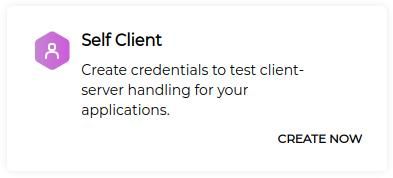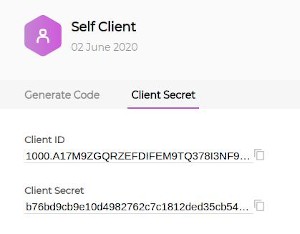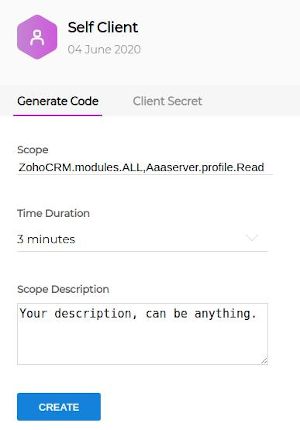You can clone ready boilerplate Zoho CRM implementation for:
Laravel
https://github.com/blowstack/zoho-crm-laravel.git
Symfony
https://github.com/blowstack/zoho-crm-symfony.git
Zoho CRM PHP SDK installation
Install the official Zoho SDK for PHP.
Open the console, go to the folder where your app resides and type the following command:
composer require zohocrm/php-sdk
Before using API you are obliged to register and use a Zoho client.
It's an easy process just go to the Zoho console and login into your account.
There are multiple ways to register a new client. During this post we will stick to self-client.

Self-client is enough to integrate Zoho CRM system in a way that your web/mobile app handles all the communication without need to authenticate other users. In other words your app will be the client / user. This will enable you to fully use all the available modules and functionality through the backend.
After registering a client there will be two tabs, don't fill the form in the Generate Code tab yet. We will only need automatically generated data from the Client Secret tab at the moment.
Having Client ID and Clients secret we can proceed to the SDK configuration stage.
Zoho CRM PHP SDK Configuration
First you have to consider where you want to keep your authorization tokens. There are two possibilities:
- in file (recommended)
- in database
SECURITY NOTICE
For security reasons I strongly discourage you to save tokens in a database thus we will cover only persistence in a file.
To proceed we need to create a file with the name zcrm_oauthtokens.txt where all the tokens will be stored.
Put crm_oauthtokens.txt into the config folder and then into a Zoho folder (you need to create it first).
Make a new controller for token generation and name it ZohoOauthController.
Inside the controller create a new array with config. Just copy & paste client id and client secret from the newly registered client (Client Secret tab).

Redirect uri has to be filled but it can be a dummy url as we use a self client and it's not really needed here. For the currentUserEmail field pass your email address for the Zoho developer console. In token persistence path pass the absolute path to the crm_oauthtokens.txt file.
$configuration = [
"client_id" => client_id,
"client_secret" => client_secret,
"redirect_uri" => redirect_url,
"currentUserEmail" => user_email,
"token_persistence_path" => path_to_crm_oauthtokens.txt
];
Symfony implementation
bin/console make:controller
- ZohoOauthController.php
<?php
namespace App\Controller;
use Symfony\Bundle\FrameworkBundle\Controller\AbstractController;
use Symfony\Component\Routing\Annotation\Route;
use zcrmsdk\crm\setup\restclient\ZCRMRestClient;
use zcrmsdk\oauth\ZohoOAuth;
class ZohoOauthController extends AbstractController
{
/**
* @Route("/admin/zoho/oauth/{grant_token}", name="admin_zoho_oauth_generate")
* @param $grant_token
*/
public function generateTokens($grant_token)
{
$configuration = [
"client_id" => '1000.A17M9ZGQRZEFDIFEM9TQ378I3NF9PH',
"client_secret" => 'b76bd9cb9e10d4982762c7c1812ded35cb54d5404f',
"redirect_uri" => 'http://dummy_address',
"currentUserEmail" => 'dev@blowstack.com',
"token_persistence_path" =>"/home/blowstack/Projects/boilerplates/zoho_crm_symfony/config/Zoho"
];
$result = 'failed';
try {
ZCRMRestClient::initialize($configuration);
$oAuthClient = ZohoOAuth::getClientInstance();
$grantToken = $grant_token;
$oAuthTokens = $oAuthClient->generateAccessToken($grantToken);
$result = 'success';
}
catch (\Exception $exception) {
$result = $exception;
}
return $this->render('zoho_oauth/index.html.twig', [
'result' => $result,
]);
}
}
- zoho_oauth/index.html.twig
{% extends 'base.html.twig' %}
{% block title %}Zoho Oauth{% endblock %}
{% block body %}
<h3 style="text-align: center">{{ result }}</h3>
{% endblock %}
Laravel implementation
php artisan make:controller ZohoOauthController --invokable
- ZohoOauthController.php
<?php
namespace App\Http\Controllers;
use Illuminate\Http\Request;
use Illuminate\View\View;
use zcrmsdk\crm\setup\restclient\ZCRMRestClient;
use zcrmsdk\oauth\ZohoOAuth;
class ZohoOauthController extends Controller
{
/**
* Handle the OAuth for Zoho.
* @param string $grant_token
* @return \Illuminate\Contracts\Foundation\Application|\Illuminate\Contracts\View\Factory|View
*/
public function __invoke(string $grant_token)
{
$configuration = [
"client_id" => '1000.A17M9ZGQRZEFDIFEM9TQ378I3NF9PH',
"client_secret" => 'b76bd9cb9e10d4982762c7c1812ded35cb54d5404f',
"redirect_uri" => 'http://dummy_address',
"currentUserEmail" => 'dev@blowstack.com',
"token_persistence_path" =>"/home/blowstack/Projects/boilerplates/zoho_crm_laravel/config/Zoho"
];
try {
ZCRMRestClient::initialize($configuration);
$oAuthClient = ZohoOAuth::getClientInstance();
$grantToken = $grant_token;
$oAuthTokens = $oAuthClient->generateAccessToken($grantToken);
$result = 'success';
}
catch (\Exception $exception) {
$result = $exception;
}
return view('zoho_oauth', ['result' => $result]);
}
}
- routes/web.php
Route::get('zoho/oauth/{grant_token}', 'ZohoOauthController');
- zoho_oauth.blade.php
<!DOCTYPE html>
<html lang="{{ str_replace('_', '-', app()->getLocale()) }}">
<head>
<meta charset="utf-8">
<meta name="viewport" content="width=device-width, initial-scale=1">
<title>Zoho OAuth</title>
</head>
<body>
<h3 style="text-align: center">{{ $result }}</h3>
</body>
</html>
Access and Refresh Token generation
The Controller and the route has been set up so it's time to generate our tokens but first you need a grant token in order to generate other tokens like access token and refresh token. The good news is it's only a one time process so let's finish it up now! Get back to the zoho developer console.

There is a Generate Code tab in the self client option . Fill the form in the following way:
- Scope*
ZohoCRM.modules.ALL, Aaaserver.profile.Read
(there can't be spaces between commas separating scope names!)
- Time duration
3 minutes
- Scope description
Whatever but it has to be filled out.
*reconsider this scope in the production environment. Those two give you minimal access needed to generate tokens and make all API calls related to modules which should be enough in most cases though.
Copy the generated grant token and paste it to the url you-rapp-address/zoho/oauth/{grant-token}.
If all went well your previously created file zcrm_oauthtokens.txt will be filled with data and you should see a success text. From now on the process will be fully automated.
What's next?
You are ready to use the API!
But you can do one more thing related to the code. Namely you can refactor it by creating a zoho service which will become truly useful when you start using the API heavily in different part of your app. It will take 2 additional minutes now but it will save you a lot of time in the future so it’s definitely worth doing it.
Symfony implementation
In the src/Service create a new class named ZohoCRM in that way.
<?php
namespace App\Service;
use zcrmsdk\crm\setup\restclient\ZCRMRestClient;
use zcrmsdk\oauth\ZohoOAuth;
class ZohoCRM
{
private $configuration;
public function __construct(array $config_values) {
$this->configuration = [
"client_id" => $config_values['client_id'],
"client_secret" => $config_values['client_secret'],
"redirect_uri" => $config_values['redirect_uri'],
"currentUserEmail" => $config_values['currentUserEmail'],
"accounts_url" => "https://accounts.zoho.com",
"token_persistence_path" => $config_values['token_persistence_path'],
"access_type" => "offline",
"persistence_handler_class" => "ZohoOAuthPersistenceHandler"
];
ZCRMRestClient::initialize($this->configuration);
}
public function generateAccessToken(string $grant_token): string {
$configuration = $this->configuration;
try {
ZCRMRestClient::initialize($configuration);
$oAuthClient = ZohoOAuth::getClientInstance();
$grantToken = $grant_token;
$oAuthTokens = $oAuthClient->generateAccessToken($grantToken);
return 'success';
} catch (\Exception $exception) {
return $exception;
}
}
}
Then pass the config values into tha services.yaml file:
//services.yaml
parameters:
zoho_crm:
client_id: '1000.FT392KQV3WP8YMZ4A8L3PPJO40DRKH'
client_secret: '676611b6b29038ab5d6cb82c2ae5bb2a7843cfb728'
redirect_uri: 'http://dummy_address'
currentUserEmail: 'dev@blowstack.com'
token_persistence_path: '/home/blowstack/Projects/boilerplates/zoho_crm_symfony/config/Zoho'
And register your new service passing the config values:
//services.yaml
services:
...
App\Service\ZohoCRM:
arguments:
$config_values: '%zoho_crm%'
Finally inject the new service into the controller and remove the old code. Notice that our controller became more readable and concise.
<?php
namespace App\Controller\admin;
use Symfony\Bundle\FrameworkBundle\Controller\AbstractController;
use Symfony\Component\HttpFoundation\Request;
use Symfony\Component\Routing\Annotation\Route;
use App\Service\ZohoCRM;
class ZohoOauthController extends AbstractController
{
/**
* @Route("/admin/zoho/oauth/{grant_token}", name="admin_zoho_oauth_generate")
* @param ZohoCRM $zohoCRM
* @param $grant_token
* @return \Symfony\Component\HttpFoundation\Response
*/
public function generateTokens(ZohoCRM $zohoCRM, $grant_token)
{
$result = $zohoCRM->generateAccessToken($grant_token);
return $this->render('admin/zoho_oauth/index.html.twig', [
'result' => $result,
]);
}
}
